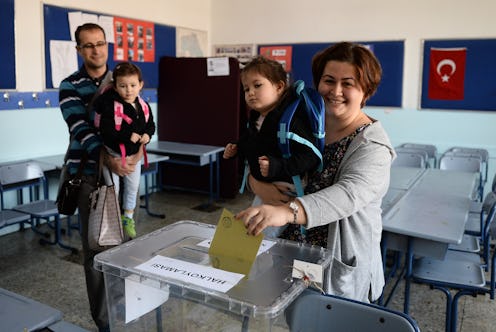News
What The Turkey Referendum Means For The Future

At first glance, it may seem like Turks headed to the polls Sunday to answer a simple "yes" or "no" question: support the president in ushering in a series of major constitutional changes, or not. However, with Turks voting on 18 constitutional amendments that would effectively abolish the country's parliamentary system and Office of the Prime Minister in favor of greatly expanding President Recep Tayyip Erdogan's powers through the adoption of a presidential system, Sunday's vote is expected to have major long-term repercussions. But what is at stake in Turkey's referendum?
With significant discrepancies between the number of votes reported as counted – Turkey's Supreme Election Commission has reported only 60 to 70 percent of votes have been counted, while the state-run Anadolu news agency has reported roughly 98 percent of votes were counted – "yes" votes were declared to hold a narrow lead nationwide. However, the country's two main opposition parties have already declared their intent to challenge the referendum result.
A Turk casting a "yes" vote Sunday is approving a series of 18 constitutional amendments pushed for by President Erdogan, a man critics accuse repressing free speech and political dissent while also violating human rights. The proposed amendments would undoubtedly led to some major changes in Turkey's political system, and, potentially, in their relations with allies and neighboring countries.
The amendments up for consideration were introduced in December by Erdogan's ruling Justice and Development Party, known commonly by the acronym AKP. They argue the amendments are necessary to correct what they see to be serious issues with Turkey's parliamentary system. Under the country's current system of government, citizens elect both a parliament and a president to create a sort of hybrid parliamentary-presidential system. Supporters of a "yes" vote argue the country's hybrid system of government allows for too much risk of potential deadlock should the prime minister and the president fail to agree. In essence, they argue that in shifting the power to the presidency, the government will become more effective.
Opponents, however, claim a "yes" vote will move Turkey firmly toward authoritarianism as President Erdogan, a man who has been the dominant figure in Turkish politics since his election as prime minister in 2003, seeks to regain the executive powers he lost when he reached the three-term limit in 2014. Erdogan was elected president in 2014, a role that has traditionally been seen largely as ceremonial. Critics of Erdogan's constitutional amendments have accused him of not only trying to take back the governing power but to consolidate it as well. As part of the proposed constitutional amendments, presidents would be allowed to serve three consecutive terms of five years each, potentially enabling Erdogan to remain in power until 2029.
The proposed presidential system has also been seen as a move toward further diminishing the role the country's military, which has traditionally been seen as a sort of "guardian" to the nation's secularist values, plays in politics. Following a failed coup attempt last summer, President Erdogan declared a state of emergency, which gave him the power to fill military appointments and thus granted him some control over who holds positions of power in the military.
However, the presidential system Erdogan has proposed does not completely resemble the American presidential system. While cabinet appointments require Senate approval in the United States, Turkey's proposed constitutional amendments would enable the president to appoint cabinet officials and a vice president without parliamentary approval or oversight. They would also give the president enhanced veto power, the ability to pass presidential decrees equal to parliamentary-passed laws, and the power to dissolve parliament at will in favor of new elections. Moreover, the amendments would require an absolute majority in parliament to override presidential vetoes (as opposed to the current simple majority required) and revoke parliament's power to impeach the president.
The head of the Turkey electoral board declared that the "yeses" had it, though the final results won't be confirmed for a few more days. However, it seems safe to say the country's political and economic instability won't come to a quick end no matter if Turkey votes "yes" or "no."